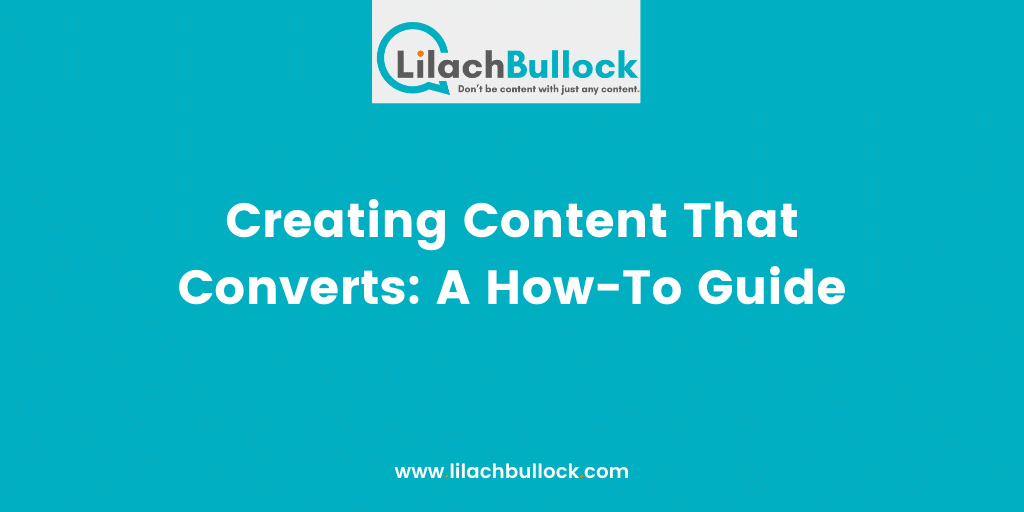Follow Lilach

Creating Content That Converts: A How-To Guide
Are you struggling to create compelling content that makes people want to read, share, and make purchases? You may be a great writer, have a huge number of social media followers, offer a great product/service, and have a user-friendly website… but none of that matters if you’re not making money.
Here’s the thing: creating content is easy – creating content that converts is a science. Conversions are the lifeblood of every business; they’re the end result of a successful sales funnel that begins with informative and well-written content.
You don’t need a fancy degree, an expensive marketer, or even an SEO agency to create your content. Actually, we’re going to tell you exactly how you can help improve your website’s conversion rates and increase profits; you just have to follow along!
A Great Domain Name Can Up Your Game
Every now and then a website with a weird domain name becomes wildly popular and has great success. Unfortunately, this isn’t always the norm and no, you shouldn’t try to use a random domain name for marketing purposes.
With this said, you need to pick a domain or website name that people can remember. Finding cheap domains that match your niche, aren’t full of random numerals or hyphens, and are unique to your brand can be difficult, especially if you don’t get creative.
If you brainstorm some ideas, you might be able to find the perfect web address and pick from top-level domains (TLDs). If you’re not sure what a top-level domain is, it’s the ending to your web address – (dot)com, (dot)net, (dot)org, etc. Having recognized TLD builds trust with your audience and is usually easier to remember than something like (dot)xyz.
Why Headers and Subheaders Matter to Search Engines
Years ago, search engine optimization (SEO) focused mainly on keywords that matched the user’s query. Currently, search engines are focused on the searcher’s intent – what is the user hoping to learn from their search?
Headers and subheaders are how search engines locate and categorize your website. This is done to match your website to their results page to give their users the best experience possible (which is done by giving the user the answer they’re looking for).
Header 1 (H1) should only be used once per page, this is what designates the topic and is based off of the title. Subheaders (most often Header 2) are used to break the information into digestible bits. This makes the information easier for the audience to consume while also allowing the search engine to offer more relevant results.
You’ll have several Header 2 subsections which should be written naturally. By naturally, we mean not forcing specific keywords into a subheader when variations such as the plural/possessive form or a synonym would be better fitted to what you’re aiming to say.
Keep in mind that most search engines ‘read’ as humans do: top to bottom and left to right. Therefore you should aim to keep the majority of your keywords and phrases toward the top of your page. Yes, they’ll help you no matter what, but they’re more helpful (for SEO purposes) toward the beginning.
Get Inspired by Other Popular Blogs and Websites in Your Niche

Creating topics that are relevant to your industry, currently trending, and interesting can be difficult, especially if you’ve never done it before. Don’t be afraid to poke around and take a peek at what other industry leaders are writing about and how they’re presenting the material.
This doesn’t mean you should copy exactly what another website or blog is writing about nor their specific wording. However, you can definitely repurpose some of their ideas or present those same topics in a new and exciting way. The goal is for your website to offer insightful information to searchers (and to rank better than your competition).
Considering the above, take a minute to browse the first search engine results page. These results will give you a better idea of what people are searching for. This information can help you create a more comprehensive webpage, ultimately helping your brand rank better, increasing visibility, traffic, and conversions.
Know Your Audience
You can pour your soul into creating content, but if you don’t know who your target audience is, it’s usually a waste of time.
Figure out who your ideal customer is by asking yourself some questions:
- What is your current customer base? Are they the appropriate market for your product/service? Why or why not?
- If your current customers aren’t the intended market, who is? Include all possible demographic information. Also consider socioeconomic factors such as education, income, and marriage/divorce rates.
- Why is your product/service best for them? Why not?
- Is your audience new to your product/service, new to your brand, or are they recurring customers?
Each of those questions will help you craft content that is specific to your ideal customers’ needs, helping you to receive more high-quality leads that have better potential to convert. All of these factors should be considered when you write new content for your website, no matter what type of content it is (blogs, landing pages, descriptions, etc.)
While you’re developing your target market and ideal customers, consider how user-friendly your website is. This is particularly important if you’re targeting people who may be less tech-savvy than others.
To help increase usability and allow users to find exactly what they need, you should consider a WordPress search plugin. While a search feature may seem like it only benefits consumers, it can have a positive impact on conversions. A search plugin can ‘learn’ which pages are most popular and relevant to queries and even direct visitors to your most important pages which means that visitors stay on your page longer, are happier with their experience, and are more likely to convert!
Try Proven Writing Formulas
There are numerous copywriting formulas that people use with great success. One of the most common ones being AIDA – Attention, Interest, Desire, Action.
This particular formula draws Attention with a great title and introduction, thereby creating Interest. You create Desire by explaining how your product/service can help that person and their pain points. Finally, you call them to Action (CTA) by telling the customer/visitor/user to complete a task. The action might be for them to buy your product, contact you, or to read another post.
You can create multiple CTAs throughout your content, especially blog posts, asking the visitor to read more, buy now, view an infographic, contact you, etc.
Creating Content That Converts: The Takeaway
Creating content that pushes conversions isn’t necessarily easy but it’s not rocket science, either. If you follow the above steps and practice your new skills, you will quickly be on your way toward improved profits from your website.
It’ll take time, effort, and probably more than a few drafts, but it’s very much a doable task if you’re willing to do a bit of research and push yourself!

Follow Lilach















